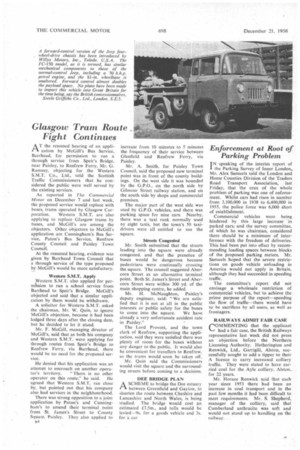Enforcement at Root. of Parking Problem
Page 38

If you've noticed an error in this article please click here to report it so we can fix it.
j1s1 speaking of the interim report of 1 the Parking Survey of Inner London, Mr. Alex Samuels told the London and Home Counties Division of the Traders Road Transport Association, last Friday, that the crux of the whole problem of parking was one of enforcement. Whilst cars had risen in number from 3,100,000 in 1938 to 6,400,000 in 1955, the police force was 6,000 short of establishment.
Commercial vehicles were being hindered by this large increase in parked cars; and the survey committee, of which he was chairman, considered there should be a minimum of interference with the freedom of deliveries. This had been put into effect by recommending loading spaces between blocks of the proposed parking meters. Mr. Samuels hoped that the severe restrictions on goods vehicle unloading in America would not apply in Britain. although they had succeeded in speeding traffic.
The committee's report did not envisage a. wholesale restriction of commercial vehicles, but to achieve the prime purpose of the report—speeding the flow of traffic—there would have to be sacrifices by all users, as well as frontagers.
RAILWAYS ADMIT FAIR CASE rOMMENTING that the applicant %-• had a fair case, the British Railways representative last week did not press an objection before the Northern Licensing Authority. Hetherington and Renwick, Ltd., Garrigill, Alston, successfully sought to add a tipper to their A licence to carry increased colliery traffic. They were stated to have carried coal for the Ayle colliery. Alston.. for 22 years.
Mr. Horace Renwick said that each year since 1953 there had been an increase in coal transport and in the past few months it had been difficult to meet requirements. Mr. S. Shepherd, manager of the colliery, said that Cumberland anthracite was soft and would not stand up to handling on the railway.




























































































